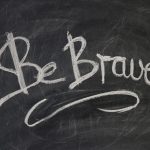Don’t be afraid, try to love!
 The fear of loving, sooner or later, strikes everyone.
The fear of loving, sooner or later, strikes everyone.
A big delusion, low self-esteem, a failure, grief: you feel discouraged and overwhelmed by impotence. The fear of loving, of being loved and of spending energies and strengths on something or someone chains down to the chair and puts a dark blindfold over the eyes. But it’s time to break the chains now and get back to see again with the eyes of hope, because loving and being loved is not just a right, but also a potentiality that, as such, must be honored, practiced and trained!
Let’s start from the name. It’s called Philophobia: fear of love. It manifests as a reaction to defend from the fear of suffering, of feeling again (it often happens after a loss) the feeling of losing a part of ourselves, as if one of our limbs got amputated. Ever felt the sensation of your heart burning in your chest? Recent researches have shown that the number of neuron bundles going from the heart to the brain is greater than the one going from the brain to the heart. There’s a cardiomind (which I find extremely romantic) and the feeling of having the heart in flames while suffering is cerebrally imposed to the sensation we would have if our heart was really burning. No wonder the fear of loving and being loved shows up as a defense against such an intense pain.
Being in love (to be intended as loving someone/something or loving ourselves) unleashes a humoral process in our brain, bound to hormonal phases, that makes this phase similar to what is called “obsessive compulsive behavior” in psychology. A real addiction! And I’d say it is a marvelous addiction, in this case. Unfortunately, as such, it takes the experience of inurement (larger and larger quantities of substance are needed in order to perceive the initial sensations) and of abstinence (very similar to the sensation of dying if substance assumption is suddenly suspended). The fear of loving and being loved, in its most critical form, turns into real anxiety and panic attacks. What are the symptoms?
- Feelings of suffocation;
- Nausea;
- Shivers and trembles;
- Tachycardia;
- Thoughts of running away;
- Depression
Very unpleasant, isn’t it?
Psychology, biology and sociology have been struggling for years to find the origins of love. Whatever the different theoretical declinations may be, reality is always one: love happens. If we’re afraid of it, we risk losing the chance to live one of the best existing experiences. A cocktail of emotions and totalizing feelings, some kind of bursting and creative energy that can be translated into one of our best potentialities: loving and being loved.
And now, some good news! The fear of loving can be overcome!
We’re genetically, socially and psychologically led to sharing and love. Never forget it. How to “heal” the fear of love?
A dear friend of mine, a theology enthusiast, once told me a little story I’d like to share with you: two friends with different religions meet up (I’d avoid taking sides as it would result ambiguous) and, while talking about love, one of them says: “the difference between our philosophy and yours is that when you fall in love you think you found the right person; we fall in love because we think we are the right person”.
Let’s talk about it. Are you the right person?
Loving and being loved means removing every uncertainty, putting away the mask made of social superstructures and reveal ourselves for what we are. Falling in love requests a fusion and, paradoxically, it is only a stable boundary that lets us not be afraid of this kind of emotional permeability.
Do you want to overcome fear and be loved?
Start from yourself. Find yourself again, your boundaries, your limits; feel complete in your unique and unrepeatable essence.
In a society like the one we’re experiencing today, where love is often associated to values such as money and success, the fear of loving is often translated into the necessity to stand out in order to be respected and desired. Find your center.
Ask yourself who you are.
Fear of loving ends where you begin, with determination and a little of healthy egoism. Identify your goals, focus on what you like the most and on what makes you feel fulfilled. Learn to recognize your discomfort. Listen to yourself. If the fear of loving is a defense, that means it has the value to protect you. Learn to appreciate it. Find your boundaries. Fear of loving can be overcome by loving ourselves first.


 Share On Facebook
Share On Facebook Tweet It
Tweet It



























